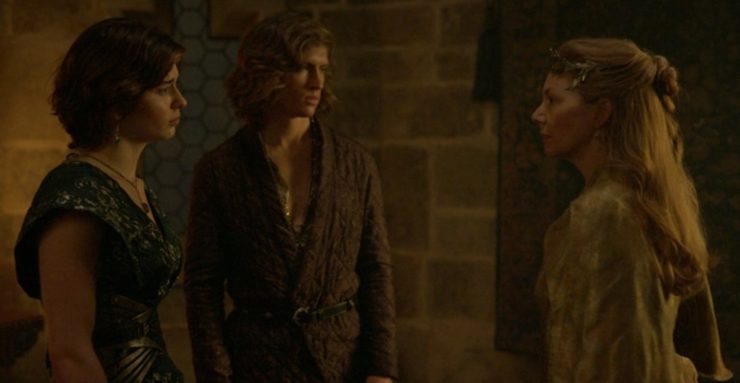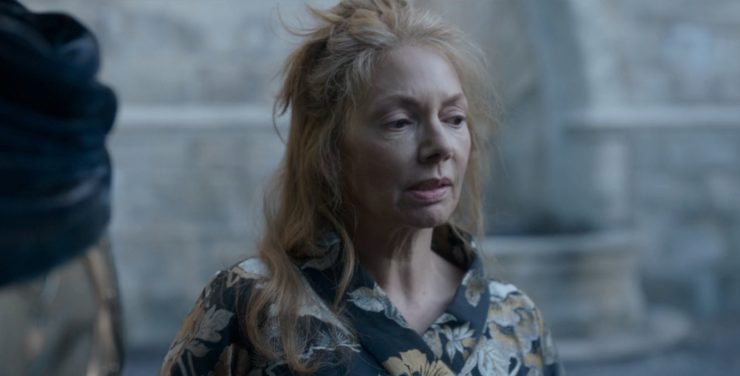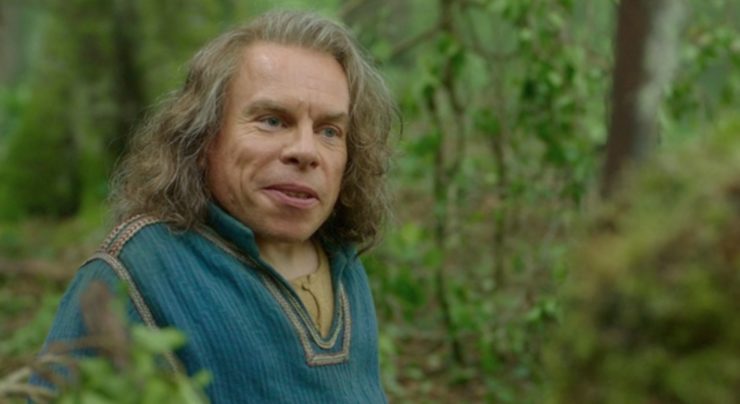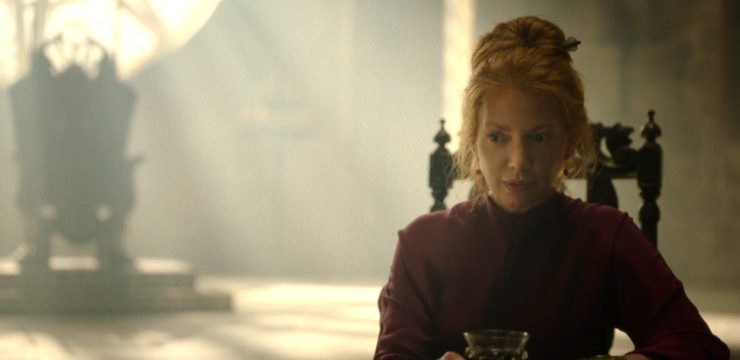The Willow television series has begun on Disney+, and already garnered reviews that seem either bafflingly positive or suspiciously over-negative. (The internet does set us up for these sorts of takes, I’m afraid.) In fact, the opening two episodes display a great deal of promise, but it’s impossible to tell if the show is capable of creating a satisfying meal from the pieces it’s ground down.
And a lot of that will come down to how it chooses to treat the character of Queen Sorsha.
[Spoilers for Willow series premiere.]
For those who are a little shaky on their Willow history, a brief reminder: the film follows the quest of a Nelwyn named Willow Ufgood and his fighty, smart-mouthed Daikini companion Madmartigan as they care for the infant to-be empress of Tir Asleen, Elora Danan, and stop the evil sorceress Bavmorda from taking over their world. In the process, they manage to get Bavmorda’s warrior daughter Sorsha on their side because she falls in love with Madmartigan. They are also aided by an old sorceress named Raziel, who is stuck in various animal forms for much of their journey. Willow, desperate to be a sorcerer himself, is gifted a magic wand and plenty of tutelage, but ultimately uses sleight of hand to save the day.
Willow is a funky little cult classic, which means it has a unique advantage in the reboot era—the stakes for its success are less dire than stories with intended decades worth of cash flow attached to them. With this delightful film, the questions surrounding its continuation are likely less ‘how do we make this continue forever and sell merchandise to kids every holiday season?’ and more ‘why not try something unique (for a corporate, very safe definition of the word) because this is a great playground for it?’
The result is a series with a few lovely curveballs tucked in—set about twenty years since the film, we find that Sorsha and Madmartigan had twins named Airk (aw, their dead buddy) and Kit, and Willow hasn’t been seen in many years. Neither has Elora Danan, and for good reason—Willow had a vision that her ascension would bring about the destruction of their world, and so it was agreed to hide her away for her own safety. Madmartigan is also nowhere to be found, his children believing that he abandoned his family. Kit’s best friend Jade yearns to be a knight, and is about to leave the kingdom to begin her training right as Kit is set to be married off to Prince Graydon from a neighboring kingdom for the sake of “stability.” Airk is flirting with a kitchen maid he calls Dove, who is utterly smitten with him.

Things quickly go awry when Kit lets Jade know that she wants no part of her marriage and kisses her, Tir Asleen is attacked by evil creatures who kidnap Airk, and a quest is suddenly assembled to retrieve him. Dove sneaks off to accompany the party because she loves Airk that much.
It’s a tickling alteration on the standard format: The prince gets to be the damsel in distress, and the two “jocks” of the questing group are young women who happen to be in love. So far, so lovely.
This all gets far more complicated when the band finally reaches the home of Willow Ufgood, the sorcerer Queen Sorsha told the group to seek out for aid. He takes one look at Dove and utters some magic words to reveal a familiar sigil on her arm—she is Elora Danan, and now they’ve got a much bigger problem since the intended future-empress has wandered far from home and never even attempted the magic she needs to master in order to protect herself or her kingdom.
So the quest to find Airk and teach Elora magic have become clearer, but there’s still much more to be done. And so much of it relies on a figure who thus far isn’t receiving the attention she deserves: Queen Sorsha.
To begin, it’s disheartening in the extreme that Sorsha isn’t an active part of the quest, less from a logic standpoint (obviously someone has to stay back and rule the kingdom), and more for the fact that the questing group has zero older women in it. This is effectively a step down from the original film, where Raziel served as a sort of Merlin figure to Willow—a role that women are seldom permitted to inhabit, particularly when they are elderly, and the movie managed without bluster. As it stands, we currently have a group with several women under the age of thirty, one young man, and several more men from their thirties into middle age. Not a great look in terms of suggesting who’s allowed to play “active” roles in stories.
But more to the point, and as far as we’ve learned, this world has been entirely shaped by Queen Sorsha’s choices over the past decades. And this matters even more when we stop to think, for even a moment, about her story in the initial film. A story that is largely overrun by the antics of Madmartigan, the determination of Willow, and the fate of Elora Danan herself.
Sorsha was the daughter of an evil sorceress queen who imprisoned all pregnant women in her realm after learning of a prophecy about a baby who would bring about her downfall. A fearless warrior of impressive skill, Sorsha did everything her mother asked until falling in love with Madmartigan resulted in her switching sides, fighting against Bavmorda unto her defeat.
But the thing about Sorsha’s turn is, really, it hardly takes a thing.
Sure, Madmartigan is charming by a half, but he’s hardly a reliable bet in the romance department. It’s so clear that Sorsha is looking for an excuse to get away from her mother’s influence. She grabs the first substantial out she’s given with both hands and uses it to end Bavmorda’s reign once and for all.

Sorsha is the queen of Tir Asleen now, which means that despite her mother’s misdeeds, she proved herself so well that no one took issue with her being in charge. But there are decisions that she’s made in the intervening years that are clearly being swayed and informed by her own trauma, and so far the series has only barely glanced at that motivator—specifically in the moment when Kit tries to take her mother to task for her impending forced marriage. Sorsha lets Kit know that she has little sympathy for her daughter’s unhappiness given what her own mother made her endure. It’s a brief thought that hardly scratches the surface of how she’s handled her role as queen, and how her past has affected the person she has become. So far, the story is far more focused on the next generation and the eponymous lead character himself—all of whom deserve that focus, of course. But Sorsha should receive the same level of consideration and development given how her choices have molded the lives of everyone around her.
Perhaps the most upsetting of these choices: We have learned that Madmartigan did not abandon his family, but went on a quest to locate a set of mythical armor at Sorsha’s behest… and for some reason, this was not communicated to his children from the start. I’m sure the two of them thought this was for the best somehow, that refusing to tell the twins what Madmartigan was really doing would prevent them from trying to search him out on their own, but letting your kids think their dad went out for a pack of pipeweed and never came back is far more damaging to them in the longterm.
We are also shown the fallout with Willow, one that occurred following a vision the Nelwyn had about Elora Danan’s future. Sorsha and Willow disagree about how they should respond to this vision—in Willow’s mind, it’s time for him to begin training Elora in sorcery, while Sorsha believes that it will increase their collective safety if the girl’s identity is hidden (even from herself), and the magic forgotten. It is never once pointed out to Sorsha that her feelings on magic might perhaps be a little, shall we say, shadowed by what she witnessed in her own mother. And when Willow tells her that she shouldn’t be worried about this because he’s a great sorcerer, she replies by gently telling him that.. well, he’s not really.
This sets Willow off, resulting in his subsequent storming from the castle, and a promise that he will only look out for him and his own people forthwith. It’s a segment of scenes treated as simple flashback when nothing could be further from the truth—what we’re seeing, in fact, is both Willow and Sorsha’s pain and flaws expertly dragged out and stomped all over. Sorsha’s not wrong about Willow’s abilities thus far; he’s certainly connected to magic, but his skills as a sorcerer are remote and largely untested. That doesn’t change the fact that saying so to his face was hurtful. And Willow’s not wrong that Sorsha is likely handling Elora’s destiny in a manner more designed decrease her own worry than to benefit the child and the future. That doesn’t mean that he couldn’t have found a different argument in favor of giving Elora the training he believed she needed, or that leaving in a huff after vowing to cut his dearest friends out of his life was the right move.

Ultimately, Willow is the character we’ll be spending more time with—he’s with the quest group, he needs to be available to teach Elora, and the series does bear his name. I’m glad for that because Willow is an excellent character who deserves far more attention paid to him, flaws and all. It’s delightful watching the series highlight everything that makes him compelling years down the road, from his compassion and kindness to his fear of being insignificant to the irascibility that rears its head whenever people upset or disappoint him. But Sorsha is a cornerstone of this story too, and so far, she’s not being shown the same level of consideration.
The series has plenty more episodes to prove me wrong, so we’ll see where we end up. But the question of whether or not Sorsha’s past is put to constructive use in this sequel of sorts will ultimately determine its success for me. It’s nice to see the younger generation come into their own, great to see queerness woven into the story without so much as a remark, wonderful to see Warwick Davis back in one of his greatest roles, but Willow is beloved for a few more pieces that deserve their due. Let’s hope the show is up to the task.










